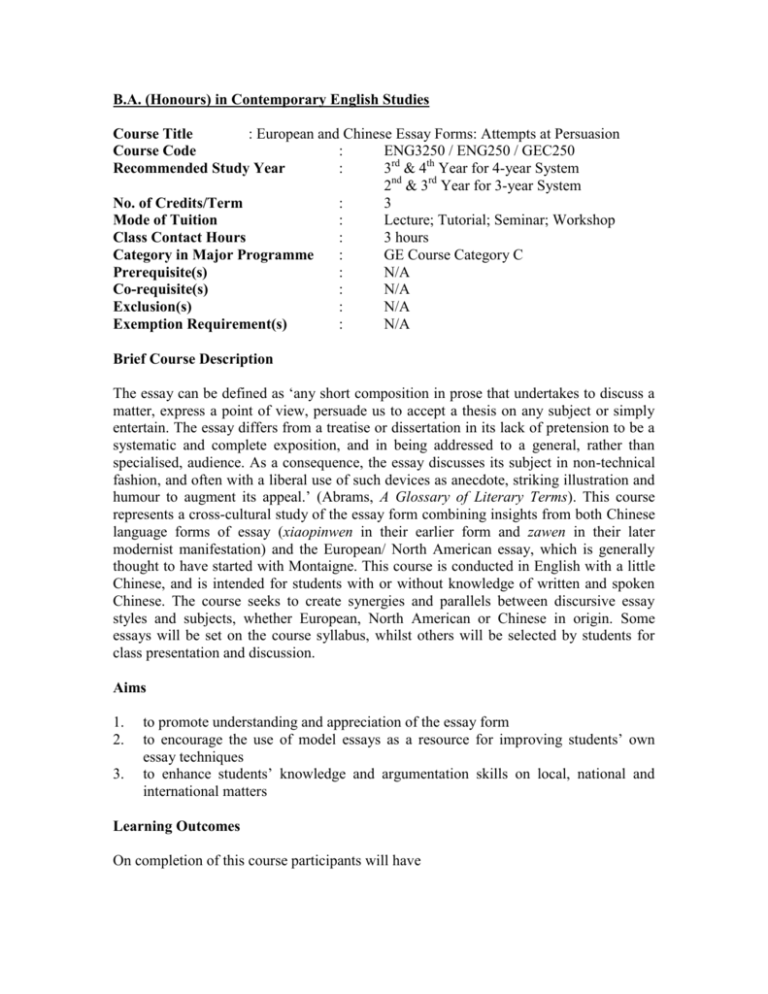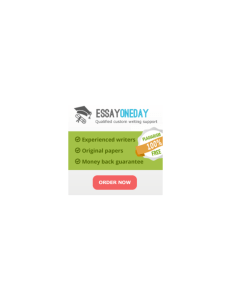European and Chinese Essay Forms: Attempts at Persuasion
advertisement

B.A. (Honours) in Contemporary English Studies Course Title : European and Chinese Essay Forms: Attempts at Persuasion Course Code : ENG3250 / ENG250 / GEC250 Recommended Study Year : 3rd & 4th Year for 4-year System 2nd & 3rd Year for 3-year System No. of Credits/Term : 3 Mode of Tuition : Lecture; Tutorial; Seminar; Workshop Class Contact Hours : 3 hours Category in Major Programme : GE Course Category C Prerequisite(s) : N/A Co-requisite(s) : N/A Exclusion(s) : N/A Exemption Requirement(s) : N/A Brief Course Description The essay can be defined as ‘any short composition in prose that undertakes to discuss a matter, express a point of view, persuade us to accept a thesis on any subject or simply entertain. The essay differs from a treatise or dissertation in its lack of pretension to be a systematic and complete exposition, and in being addressed to a general, rather than specialised, audience. As a consequence, the essay discusses its subject in non-technical fashion, and often with a liberal use of such devices as anecdote, striking illustration and humour to augment its appeal.’ (Abrams, A Glossary of Literary Terms). This course represents a cross-cultural study of the essay form combining insights from both Chinese language forms of essay (xiaopinwen in their earlier form and zawen in their later modernist manifestation) and the European/ North American essay, which is generally thought to have started with Montaigne. This course is conducted in English with a little Chinese, and is intended for students with or without knowledge of written and spoken Chinese. The course seeks to create synergies and parallels between discursive essay styles and subjects, whether European, North American or Chinese in origin. Some essays will be set on the course syllabus, whilst others will be selected by students for class presentation and discussion. Aims 1. 2. 3. to promote understanding and appreciation of the essay form to encourage the use of model essays as a resource for improving students’ own essay techniques to enhance students’ knowledge and argumentation skills on local, national and international matters Learning Outcomes On completion of this course participants will have 1 2 3 4 5 read and appreciated a diverse range of essays - personal, polemical, reflective, witty, factual, imaginary, etc. developed ability to deploy logical arguments in the written form in both languages or in English only, depending on language ability. become aware of strategies for improving their essay-writing skills in one or both languages in the process of appreciating good essayists and apply these skills. explored parallels in subject matter, structure, style and rhetoric across the usually discrete cultural and linguistic sign systems of our society. developed sensitivity to topics which arouse interest in both reading and writing and broadened their knowledge of world affairs and cross-cultural matters.. Indicative Content 1 2 3 4 Examples of great essayists: English/ European. North American – Montaigne; Swift; Orwell; Woolf; Sontag; Vidal; Eco; (others). Asian English – Roy; Aung San Suu Kyi; Xu Xi. (others). Chinese (in translation): Han Yu; Li Yu; Lu Xun; Eileen Chang; Huang Chunming; Yu Kwang-chung (others) Essay approaches: narrative; descriptive; argumentative; dialectical; pedagogical. Essay discourse: exemplification; comparison and contrast; cause and effect; classification and division; definition Study focus –Argumentation skills; expository writing skills; language structure Choice of title; Use of rhetorical devices (e.g. direct questions) and polemic; structural features; stylistic choice – formal/ impersonal or informal/ personal; explicit/ implicit argumentation; deductive/ inductive argumentation; use/ non-use of data, statistics, examples, facts; personal experiences, anecdotes; vocabulary choice; use of lexical/ syntactic repetition; reader response/ reception; personal reaction. In the seminars participants will discuss content and style in the exemplar texts, while in the workshops students would develop their own essay writing style and general language awareness in presenting arguments on a wide range of topics. Topics can be suggested and themes for essay reading and writing established at the outset of the course. Current themes and social topics can be used especially if they resonate with themes and issues found in essays of an earlier period. Participants will be able to observe the way history and the history of rhetoric repeats itself through the development of the essay form and its subject matter. Teaching Method Lectures, tutorials, seminars and workshops Measurement of Leaning Outcomes 1. Students will give an oral presentation on two contrasting essays to demonstrate understanding of essay approaches, styles and arguments - Learning outcomes 1, 4, 5 2. Students will submit a written evaluation of a model essay in order to respond critically to structure and argument in the respective pieces. - Learning Outcomes 2, 5 3. Students will produce a long essay of approximately 3000 words based on an essay model or models in style structure, rhetoric, etc. and thus demonstrate their ability to apply the discourse strategies and techniques of model essays to their own creative argumentative writing. - Learning outcomes 2, 3, 4 4. Students will engage and participate actively in tutorials and seminar discussions and give evidence of reading with understanding and critical appreciation of the examplar essays as well as personal responses to opinion and argument. They will also be expected to demonstrate original thinking in the planning of potential essay topic and subjects - Learning outcomes 1, 5 Assessment 100% continuous assessment: 20% (Task 1); 25% (Task 2); 40% (Task 3), plus 15% for tutorial participation. Required Readings Gross, John. The Oxford Book of Essays. Oxford: Oxford UP, 1991. Pollard, D. Chinese Essays in Translation. Renditions, Chinese University Press, 1999. Suggested/ Further Readings Atkins, G. Douglas. Tracing the Essay: Through Experience to Truth. Athens, GA: U of Georgia P, 2005. Aung San Suu Kyi, Freedom from Fear and Other Writings. London: Penguin. Revised edition, 1995. Bensmaia, Reda. The Barthes Effect: The Essay as Reflective Text. Minneapolis, MN: University of Minnesota Press. 1987. Eco, Umberto, trans. Alastair McEwen Five Moral Pieces. Orlando: First Harvest Edition, Harcourt Inc. 2002. Forman, Janis. What do I Know? Reading, Writing, and Teaching the Essay. Portsmouth, NH: Boynton/Cook, 1995. Good, Graham. The Observing Self: Rediscovering the essay. London: Routledge, 1988. Heilker, Paul. The Essay: Theory and Pedagogy for an Active Form. Urbana, IL: NCTE, 1996. Lopate, Phillip. What Happened to the Personal Essay? Against Joie de Vivre. New York: Poseidon, 1989 Mill, J.S. On Liberty. London: Penguin Classics, 2006. Montaigne, Michel de. Essays. New York: Penguin, 1987. Orwell, George. Why I Write and Other Essays. London: Penguin, Great Ideas. 2004. Roy, Arundhati, The Algebra of Infinite Justice and Other Essays. London: Flamingo, 2002. Smith, Alexander. On the Writing of Essays. Essays British and American. Andrew T. Smithberger, Ed. Boston: Houghton, 1953. Screech, M.A. Montaigne and Melancholy: The Wisdom of the Essays. Lanham, MD: 2000 Sontag, Susan. Regarding the Pain of Others. New York: Farrar, Strauss and Giroux. 2003 Sontag, Susan. At the Same Time: Essays and Speeches. New York: Farrar, Strauss and Giroux. 2007. White, E.B. The Essayist: Essays of E.B.White. New York: HarperPerennial, HarperCollins, 1989. Vidal, Gore. Perpetual War for Perpetual Peace. New York: Nation Books, 2002. Woolf, Virginia. ‘The Modern Essay’ in The Common Reader. New York: Harcourt, 1925. 293-307. Woolf, Virginia. A Room of One’s Own. Orlando: First Harvest Editions, Harcourt Inc. 1981. Zeiger, William. "The Exploratory Essay: Enfranchising the spirit of enquiry in college composition." College English 47 (1985): 454-66.






